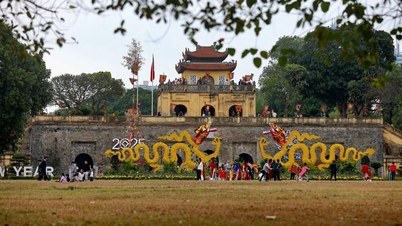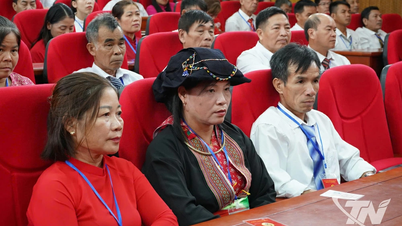Bright spots and challenges
Looking at the overall picture, we can see a positive change in the application of digital technology in the cultural field. Currently, Vietnam has a smartphone user rate of 84.4%, higher than the global average of 63%. Fiber optic coverage to each household is nearly 80%, compared to the world average of about 60%. These are important premises, creating favorable conditions for accessing and consuming digital cultural products. At the same time, in recent years, Vietnam has achieved many remarkable achievements in developing digital infrastructure. In 2024, telecommunications infrastructure made great strides when the Telecommunications Department coordinated with network operators to complete the 5G spectrum auction, completed the shutdown of 2G waves on land, popularized 3G and 4G infrastructure and promoted 5G commercialization, helping people use broadband services with better quality, faster speeds and more features.
One of the obvious achievements is the application of technology in publishing. Statistics from the Vietnam Publishing Association show that in 2024, electronic publications increased sharply, reaching 4,050 titles (up 120.7%), accounting for 8.9% of the total number of publications - exceeding the annual target by 2.3%. In particular, the audiobook market reached a revenue of 102 billion VND, with the number of audiobooks and e-books increasing by 200% compared to the previous year. The emergence of many online platforms in fields such as music , movies, cultural tourism, online museums... shows initial efforts in taking advantage of cyberspace to spread cultural values. In addition, some advanced technology applications such as virtual reality (VR), augmented reality (AR), blockchain (in copyright management) have also begun to appear in cultural and artistic activities and heritage conservation, opening up new experiences and potential for copyright protection.
Vietnam is currently witnessing a generation of dynamic and creative technology enterprises, which have made great contributions to the remarkable development of the country's technology platform in recent years, including Viettel Group, FPT Group, Vietnam Posts and Telecommunications Group (VNPT), CMC Company, VNG Company... These are important "technology assets", contributing to promoting the remarkable development of Vietnam's technology infrastructure.
However, besides the bright spots, the digital infrastructure for Vietnam's cultural industry still has many bottlenecks and challenges, hindering the development commensurate with its potential. According to statistics, in the period 2018 - 2022, the number of economic establishments operating in the cultural industries increased by an average of 7.2% per year, with about 70,321 establishments in 2022. The labor force in the industry also increased by 7.4% per year, reaching about 2.3 million people, accounting for 4.42% of the total labor force of the economy. Despite the growth in quantity and labor force, the quality and efficiency of operations are still not high, an important part of which is that the digital infrastructure has not met the development needs.
The quality of internet connection, especially in remote areas, has not met the needs of transmitting and experiencing high-quality digital cultural products, creating a worrying digital gap. The lack of specialized, large-scale digital platforms capable of integrating diverse types of culture and meeting the needs of both creators and consumers is a major barrier, limiting the interaction and development of the digital cultural market.
Another important factor is the shortage of human resources with specialized digital skills in the cultural sector. To maximize the potential of digital infrastructure, we need a workforce that is both culturally knowledgeable and highly technologically skilled. In terms of legal framework, there are currently not many legal documents clearly regulating state management of cultural industries in the digital context, creating gaps and challenges in regulating and promoting the development of this sector.
At the same time, investment in cultural industries is still scattered and not focused on areas with advantages and potential to create key, highly competitive products.
Perfecting digital infrastructure creates the foundation for development
According to experts, for the cultural industry to truly make a breakthrough, the need to invest in technological infrastructure is extremely urgent and diverse in each specific field. This requires a strategic vision and drastic actions.
 |
Building a solid and synchronous digital infrastructure is a prerequisite for Vietnam's cultural industry to make a breakthrough. (Photo: AI) |
What we need is a comprehensive and consistent national strategy. That is, a national strategy for developing digital infrastructure for the cultural industry with specific goals, a clear implementation roadmap and an effective coordination mechanism between relevant parties. This strategy needs to clearly identify priority investment areas, key technologies to be developed and performance indicators, ensuring feasibility and measurability.
It is now necessary to increase public investment and encourage private investment in the cultural sector. The state budget should prioritize allocating resources to key digital infrastructure projects, especially in areas with great cultural potential but weak infrastructure, creating conditions for equitable development.
Currently, digital transformation in traditional cultural organizations such as museums, libraries, theaters, cinemas, etc. through supporting the application of digital technology in management, display, performance and interaction with the public is being carried out well. This is an important step to exploit and promote the value of cultural heritage in the digital environment and needs to be further promoted in the coming time, expanding the scope of access and improving user experience.
It is important to understand that building national digital platforms for the cultural industry is now not simply a data warehouse, but also requires the ability to integrate diverse types of culture, connecting creators, service providers and consumers in a rich digital cultural ecosystem. These platforms need to be built on unified technical standards, data, security and copyright regulations, ensuring compatibility and scalability. There also needs to be policies to support technology startups in the cultural sector to develop creative solutions on these platforms, creating diversity and healthy competition.
The issue that needs special attention is the human factor. In particular, improving the quality of human resources is key to effectively operating and developing digital cultural infrastructure. To overcome the shortage and weakness, we need to strengthen training and foster a team of experts with digital technology skills for cultural industries. At the same time, we need to have policies to attract domestic and foreign information technology experts and digital culture experts, as well as promote international cooperation to learn from experience and transfer technology, narrowing the gap in qualifications.
Completing the legal framework to create a favorable environment for the development of digital cultural infrastructure is one of the important factors in completing the digital infrastructure. This includes building and effectively implementing legal regulations on protecting intellectual property rights in the digital environment, managing healthy digital cultural content and strengthening measures to ensure cybersecurity for digital cultural infrastructure platforms and systems, creating trust for both creators and consumers.
The digital infrastructure strategy to 2025, with a vision to 2030, approved by the Prime Minister in Decision No. 1132/QD-TTg dated October 9, 2024, sets the goal of building advanced and modern digital infrastructure on par with developed countries. This strategy focuses on developing telecommunications and Internet infrastructure, data infrastructure, physical-digital infrastructure, digital platforms and digital technology as a service. Effective implementation of this strategy will create a solid foundation for the development of the digital cultural industry.
If we are determined to successfully implement the digital infrastructure strategy, not only will the digital infrastructure for the cultural industry be completed, promoting strong cultural development, but it will also be a premise to contribute to making Vietnam a modern, smart digital nation.
Source: https://baophapluat.vn/ha-tang-so-cho-cong-nghiep-van-hoa-lam-gi-de-but-pha-post547921.html







![[Photo] Prime Minister Pham Minh Chinh chairs the second meeting of the Steering Committee on private economic development.](https://vphoto.vietnam.vn/thumb/1200x675/vietnam/resource/IMAGE/2025/11/01/1762006716873_dsc-9145-jpg.webp)
































































































Comment (0)